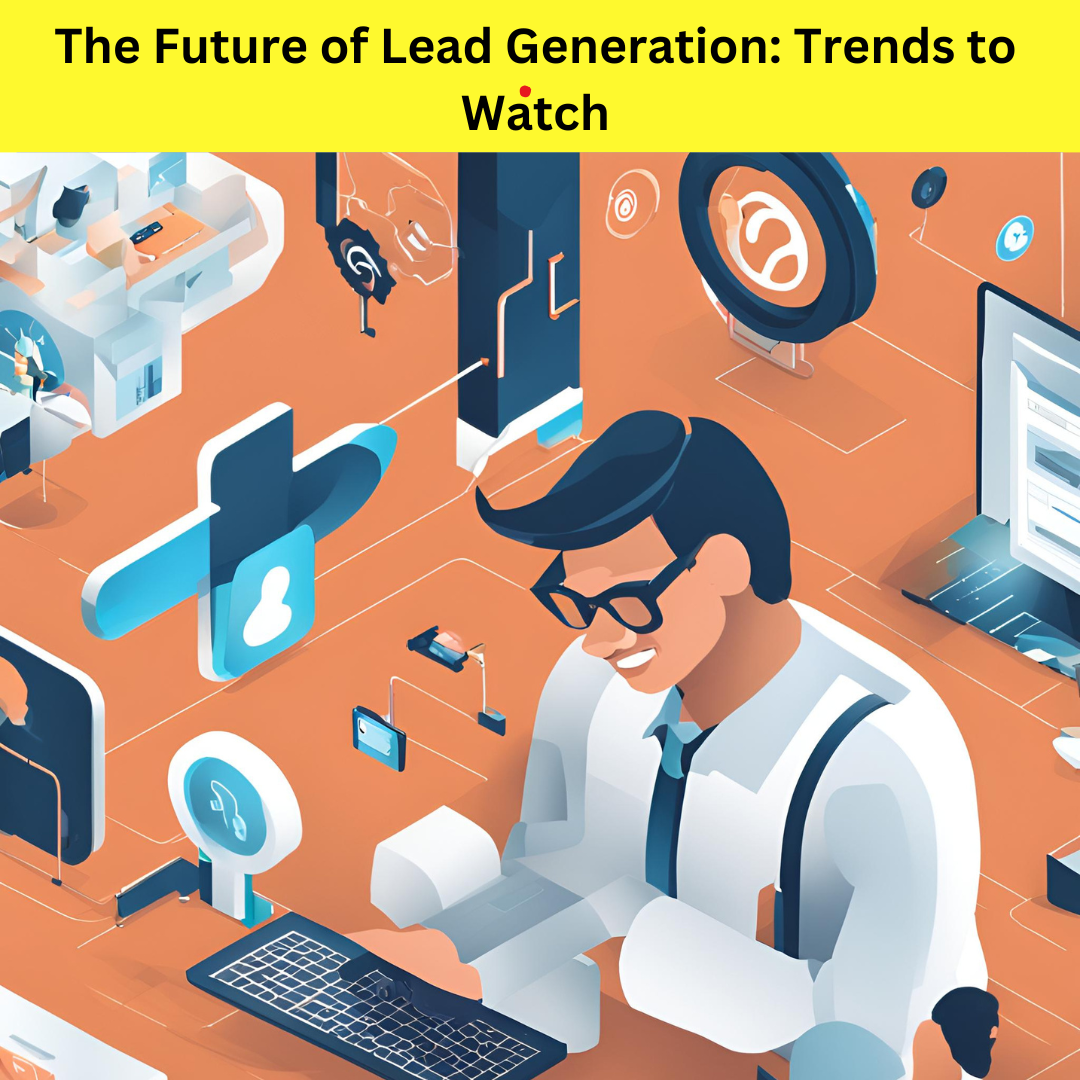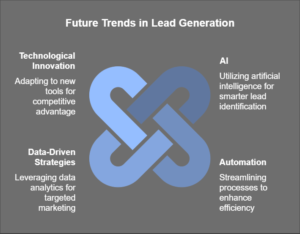
Lead generation is part and parcel of any business expansion strategy because it is attracting potential customers and then converting them into sales. The digital landscape is rapidly changing, and businesses have to adapt to new tools and technologies in order to be competitive. Technological innovation has transformed lead generation; using AI, automation, and data-driven information, companies can find and grow leads more effectively. Here’s a blog on some of the key trends that will define the future of lead generation and how businesses can utilize the trends to enhance their marketing campaigns.
Lead Generation through AI and Automation
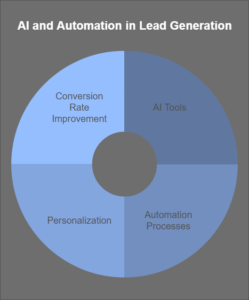
Applications of AI in the generation of leads have made a big impact on the market to ensure that companies identify, engage, and nurture leads in a more efficient manner. AI tools make predictions on the consumers based on huge data available, thus targeting those potential leads with personalized messages. This automation process can simplify processes in the workflow as automated procedures may include sending follow-up emails, scoring leads, or managing workflows, and such automation makes processes easier by improving efficiency in spending their time on the real processes of sales.
AI-driven personalization is also a game-changer: it provides customers with bespoke experiences based on their preferences and actions. For example, HubSpot and Marketo utilize AI when it comes to personalization of content, product recommendation, and even automation of outreach, which can yield more precise lead generation. With automated business processes, no lead gets away. This means improving the conversion rate and optimizing the sales funnel.
Chatbots and Conversational Marketing
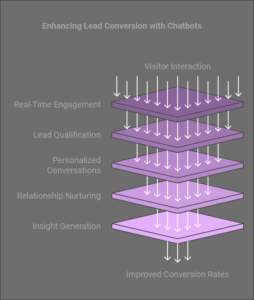
Chatbots and conversational marketing are revolutionizing the manner in which a business can capture and engage its leads. Chatbots utilize artificial intelligence to interact with visitors in real time, answer questions, and qualify leads by gathering necessary information. Thus, it reduces the response time and provides an excellent customer experience so that potential leads won’t be lost because of delayed communication. This process of conversational marketing goes beyond the basic lead generation involved in traditional approaches but builds two-way communication between the business and its prospects.
Businesses can establish stronger relationships with leads, increase trust, and nurture leads more effectively by engaging leads in personalized conversations. Moreover, chatbots are available 24/7, which means businesses can capture leads even when the sales team is offline. For example, Drift and Intercom are conversational marketing platforms that allow businesses to qualify leads, set appointments, and automatically nurture relationships, which means better conversion rates. This technology also provides great insight into customer behavior; such insight shows businesses what their leads need to better their marketing strategies.
Data-Driven Lead Generation
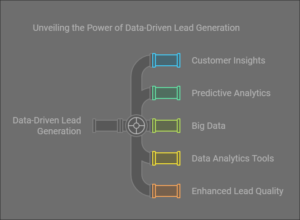
Data-driven lead generation is the future of marketing, in that companies rely on data to analyze what people will behave like next to target top leads. With knowledge of customer preferences, surfing habits, and purchase trends, companies can enhance their lead-generation strategies by leveraging data analytics. It helps the companies make future predictions of leads that will easily convert by using historical data, thereby focusing the company’s resources on high-value leads. Big data is important for companies as they can track emerging trends for optimizing marketing campaigns with the utmost impact.
Businesses can fine-tune their strategy through an understanding of consumer behavior at various touchpoints, including websites, social media, and email campaigns, all the while improving lead quality. Examples of advanced data analytics tools include Google Analytics, Salesforce, and HubSpot, which help businesses extract insights, track lead interactions, and optimize campaigns. More easily accessible and powerful, the companies that value lead generation via data-driven methodologies will be the big difference-maker when it comes to leading into the right leads at the right time.
Social Media as a Source for Lead Generation
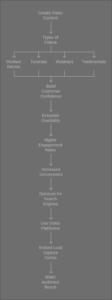
Lead generation has been on social media and is a great lead source tool. Businesses can get hold of Instagram, LinkedIn, or TikTok and gain some leads from such potential customers. It would provide a business with the capacity to listen to conversations about the brand, identify trends, and discover potential leads that might be interested in buying the products or services from a given firm. Analyzing social media activity gives a business insight into what is preferred and how customers behave. That then helps in developing the proper content that connects to the target audience.
Paid social media ads are much more developed for use on Facebook and Instagram; these allow businesses to really reach very specific audiences by location, interests, and even online behavior. One needs to build an engaged audience by posting regularly, through live videos, and with interactive content in order to create leads. For example, with the lead generation forms available on LinkedIn, companies can immediately capture contact information from users who engage with ads or content. Social media is a great means to leverage brand awareness, nurture relationships and, ultimately, convert leads into paying customers.
Lead Generation through Video Content
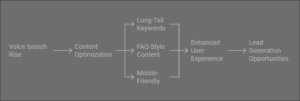
Lead generation from videos- Video content is one such new tool for lead generation as through it, businesses can speak to the potential customer interestingly. Videos include demos of products, tutorials of products, webinars by businessmen as well as customer testimonials. Through videos, businesses can earn customer confidence and establish credibility as video content is more personal and friendly. Videos also have higher engagement rates, which can lead to increased conversions. Video content is also very shareable, which helps businesses reach a wider audience.
For the full effect of video, businesses need to optimize their videos for search engines (Video SEO) to get more visibility and reach. Tools such as YouTube, Vimeo, and Wistia allow lead capture forms to be embedded in videos, which turn viewers into potential leads. Companies such as Zoom and GoToWebinar utilize webinars for deep insights into their products, which drives sign-ups and conversions. Because video continues to dominate the consumption of content, businesses using this medium for lead generation will have a significant advantage in capturing and nurturing leads effectively.
The trends mentioned above will describe what the future of lead generation should hold in business settings for the future and for now. Using ideas brought by AI, automation, chatbots, social media, and video content, firms can stay ahead of others and generate quality leads driving business growth.
Voice Search and Smart Devices
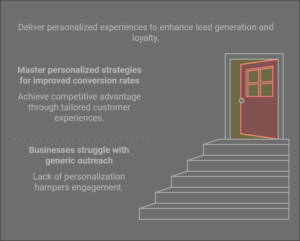
Voice search is the new norm of how users use technology, hence impacting lead generation strategies unconventionally. Smart devices such as Amazon Alexa, Google Assistant, and Apple Siri are changing how people look for products and services through voice search. Contents for optimizing voice search must be natural, answering particular questions, and must be optimized for local SEO. Since voice searches are typically more conversational and more focused on quick and direct answers to a question, contents have to be structured that way. Optimizing for voice search involves using long-tail keywords, creating FAQ-style content, and ensuring a mobile-friendly website.
In addition, as users depend on voice-enabled smart devices to interact with the brand, businesses can use these devices as lead-generation opportunities that are seamless and interactive. For example, a voice-controlled ad or promotion might invite users to take action now, such as subscribing to a newsletter or booking a consultation.
Mass Personalization
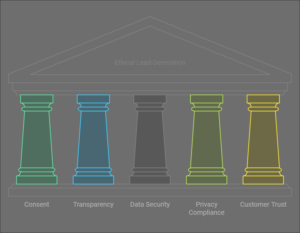
It is a significant feature of lead generation, with the customers expecting a personalized experience everywhere. It is no longer a choice, but a necessity for businesses, to stay competitive. Improvements made in AI and machine learning made it possible for businesses to personalize content, offers, or experiences for thousands of people without really compromising on the quality of the experience. Technology allows marketers to track the behavior of individual customers across multiple channels and personalize outreach based on data insights. Personalized strategies include dynamic content on websites, email marketing in personalized advertising, and product recommendations.
It enhances engagement and conversion rates for the business. For example, e-commerce websites such as Amazon do very well in showing recommendations based on user browsing and purchase history, thus converting them. Tools such as HubSpot, Marketo, and OptinMonster help in automating personalization to ensure relevant content at scale. The companies that master the art of providing relevant, customized experiences will, in due course, really show some improvement in lead generation and customer loyalty.
Privacy Regulations and Ethical Lead Generation
Because concerns about privacy are increasing day after day, regulations like GDPR and CCPA are changing how business stores lead. Thus, the emphasis of transparency is there not only on data collection practice but on privacy too. Therefore, businesses should comply with these privacy laws not to incur penalties and for the sake of customers who will lose trust in such instances. Ethical lead generation focuses on consent, transparency regarding how the customer data will be used, and offering users options to opt out of data collection. Data security also needs to be taken care of because customer information has to be kept confidential and accessed only when it is absolutely necessary. For the business to gain the trust of customers, it needs to have transparent marketing practices such as privacy policies and allowing the user to access his or her personal data. Ethical generation of leads helps in long-term relations with the customer because the consumer loves brands that respect privacy while using the data. With increasing privacy regulations, businesses must adapt their lead generation strategies to stay compliant and ethical, ensuring they maintain customer loyalty and avoid legal issues.
Conclusion
The future of lead generation is rapidly evolving, with trends like AI, voice search, personalization, and privacy regulations influencing how businesses interact with potential customers. Business success would call for staying ahead of technology-driven changes, or else they would no longer attract such good leads. The most immediate potential impacts these emerging trends could bring include efficient processes, better customer experience, and higher conversion rates for lead generation. The time to adapt and stay in line with lead generation innovation has arrived for business.
